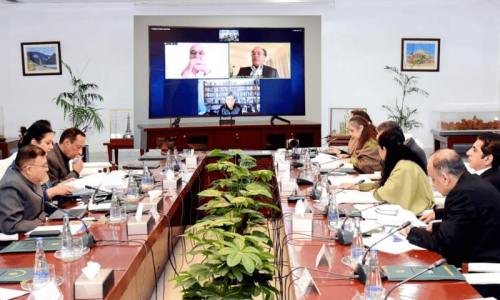ISLAMABAD: The Federal Board of Revenue (FBR) issued new procedures on Wednesday to streamline licensing, issuing electronic sales tax invoices, and integrating registered persons into the electronic invoicing system.
The amendments were introduced in the Sales Tax Rules 2006 as part of the drive to plug loopholes in the digital system of Pakistan Revenue Automation Ltd (PRAL) to raise maximum revenue and bridge the Rs4 trillion collection gap.
The new rules were notified through a SRO69 of 2025 to ensure greater accountability and efficiency in the collection of sales tax.
According to amendments, all registered persons are required to integrate their point-of-sales (POS) with the FBR’s computerised system to generate and transmit electronic sales tax invoices. This will help automate and monitor taxable supplies.
Integrated electronic licensing, invoicing system to boost efficiency, transparency
A licensed integrator must operate these systems to ensure invoice data is transmitted in a standard and secure manner. The FBR will notify particular categories of registered individuals who must comply with this integration, and those who have already completed the process of integrating their point-of-sale systems will be deemed compliant under the new rules.
The integrated persons are required to install, register, and configure their electronic invoicing systems according to the guidelines issued by the FBR. These systems must perform various functions, including generating sales tax invoices, creating digital signatures, encrypting data, and transmitting invoices to the FBR’s system in real time.
Moreover, the integrated systems will generate a unique QR code, print it on the invoice, and record every adjustment, modification, or cancellation. These records are essential for maintaining accurate logs, which will be subject to departmental audits.
The system will detect and report errors or any malpractice. If any discrepancies are detected, the system will automatically notify the FBR.
All integrated persons will be required to ensure that their point-of-sale systems can accept payments through various digital means, including debit and credit cards, and must allow for the use of QR codes for these transactions. To support this initiative, the FBR may also mandate CCTV surveillance in areas where electronic sales transactions occur.
The integrated persons will be bound to display signage at their outlets indicating compliance with the FBR’s electronic invoicing system. This will inform customers and authorities of their commitment to the new regulations.
The integrated persons will maintain electronic records of all invoices for a period of six years, which can be accessed during audits. The FBR’s Inland Revenue officers are authorised to monitor these records and perform audits as necessary to ensure compliance.
The systems will automatically generate and store a complete sales record, including detailed information such as the seller’s name, recipient details, tax amounts, and descriptions of goods or services. This information must also be available for inspection by the relevant authorities.
No person can integrate a registered person’s invoicing system without first obtaining a licence from the FBR, which has designated PRAL as a licenced integrator to provide these services, ensuring all systems comply with FBR requirements.
The FBR has also set harsh penalties for non-compliance. Registered individuals who are caught tampering with their invoicing systems or failing to integrate their systems as required by law may risk significant fines, in addition to additional disciplinary actions. Integrated people who fail to comply with the new invoicing method will face penalties under the Sales Tax Act.
Published in Dawn, January 30th, 2025

















































